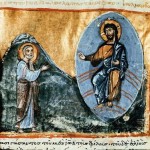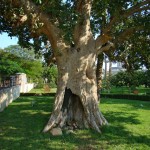It’s the first Sunday of Lent this week. Here are some things to think about while absentmindedly smudging the ashes on your forehead.
Genesis 9:8-17
What It’s About: The aftermath of the great flood, when God speaks to Noah and his sons.
What It’s Really About: This is a passage about covenant, and it’s kind of a strange one. Here, God makes a covenant with Noah, his descendants, and every panda bear, snake, and amoeba that was on the ark. Why God does this isn’t entirely clear—God’s motivations aren’t revealed. Perhaps God feels guilty? Maybe God repents of God’s actions? Or is God simply like a cover band that won’t do the same song twice? Whatever it is, this covenant comes out of nowhere, is offered freely by God, and is sweeping in its breadth. This is a covenant with “all flesh,” with creation, the cosmos, with the world.
What It’s Not About: It’s not about Israel, and that’s significant. The other major covenants in the Hebrew Bible are with specific persons or nations: the covenant with David, the covenant with Abraham, and the covenant made with Israel at Mount Sinai. Here we have a cosmic covenant—a covenant with “all flesh.” That’s significant.
Maybe You Should Think About: This is an opportunity to take on several different weighty issues. For starters, the covenant here underscores the horror of the flood; even the deity seems to recognize that a line has been crossed that shouldn’t be crossed again. This might be a good opportunity to take on the question of theodicy. Or, you could use this to preach about the universal reach and appeal of God—God here is acting of the God of “all flesh,” and not just your particular sect of Christians. Or, the especially homiletically limber among us could isolate the rainbow image—the emblem of many GLBTQ movements—and juxtapose that with the notion of a universal covenant made at God’s fiat without any regard to the types of flesh included in “all flesh.” As my denominational GLBTQ advocacy group is fond of saying, “all means all.”
Psalm 25:1-10
What It’s About: Trusting in God.
What It’s Really About: Feeling close enough to God to ask for God’s favor and protection, but not necessarily close enough to trust that it will be forthcoming without asking.
What It’s Not About: It’s not about the second half of the Psalm, which is more about rewards, enemies, and in the final verse, Israel.
Maybe You Should Think About: If your congregation has been beset lately with a lot of pastoral crises, this might be the text to preach. It’s the kind of text that will appeal to everyone some, but to some people in intense and powerful ways. It’s almost a guarantee that someone in your congregation feels this way about God right now: like they desperately need God’s comfort and protection, but that their circumstances have somehow escaped God’s notice. It’s not a bad text to pair with the Genesis above, if you’re thinking of taking on the theodicy angle. Someone out there is asking: I trust that God is merciful and faithful, but why don’t these circumstances change?
1 Peter 3:18-22
What It’s About: Being Christ-like, being Noah-like, and suffering for doing good.
What It’s Really About: This is a great example of second-generation Christian exegesis. 1 Peter is acknowledged by many scholars to be a late composition (though some insist on an early, authentically-Petrine origin), and so it might reflect the Christian thought of the late first or early second century. If this is the case, then this passage makes good sense as words directed to communities experiencing friction with the broader community, but not outright persecution. Its appeal to Noah, who was mocked by his contemporaries, and Jesus, who was mostly ignored by his, suggest a community that is doing sophisticated mining of the biblical tradition to make sense of itself in its own time and place. Noah prefigures baptism in the logic of this text, and Jesus points to the salvation that awaits those who stick their necks out for good and not evil.
What It’s Not About: This is not really an invitation to cultural martyrdom of the kind many Christian seek. What is at issue here is real abuse and even some real danger at the hands of people who simply do not understand Christian faith. This is different from “the war on Christmas” or the notion that prayer in schools is the sine qua non of Christian practice. Resist the temptation to turn this text into a sermon about how Christians in the West are persecuted. They aren’t, in any meaningful way that’s not manufactured by cable news personalities.
Maybe You Should Think About: Saying the Apostles’ Creed in church that day. That section in verses 19 and 20 about “the spirits in prison” is seen by many as the warrant for the “descended into hell” section of the Apostles’ Creed. If you’re lucky, someone in the congregation will make the connection and ask you to lead a discussion on the Apostles’ Creed!
Mark 1:9-15
What It’s About: Jesus’ Baptism.
What It’s Really About: The consequences of commitment. In the space of four verses, Jesus is 1) baptized, 2) alighted upon by the Spirit of God, 3) proclaimed the Son, the Beloved, and 4) driven out into the wilderness. Which one of these is not like the others? For Mark, baptism is the trigger for God’s presence and God’s favor. But it is also the occasion for a great deal of misery. Jesus spends time in the wilderness (take that spiritually or literally, or both), and Mark’s juxtaposition of baptism and temptation drives home the point that they are connected. All that separates them is that Markan “immediately.” We are to understand that discipleship leads us to wildernesses—it doesn’t just deliver us from them.
What It’s Not About: This is not a coronation. It is not a choreographed inauguration or a ceremony for the cameras. This is about how one thing leads to another, and commitment leads quickly to real consequences.
Maybe You Should Think About: In Mark the Spirit “drove” Jesus into the wilderness. In Matthew and Luke Jesus was “led.” If we accept the common scholarly presupposition that Matthew and Luke were expansions and revisions of Mark, and that they would have had a copy of Mark in front of them, then what accounts for this change from “drove” to “led?”











